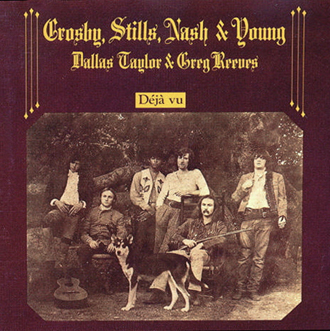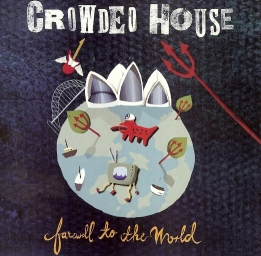
Now I'm quite happy to dig some serious "songcraft" now and again, and there are few journeymen songwriters as "craft" based as Crowded House's Neil Finn. I know there's a serious "I'm going to wear a T-shirt with Crowded House written on the front of it" element to the band, but there's no denying they made some decent records. The first eponymous Crowded House album (1986) is a pretty decent piece of solid songwriting, and it has some big numbers on it ('Don't Dream It's Over', 'Something So Strong') but it does have some seriously mediocre stuff too ('Hole in the River', 'Love You 'Til the Day I Die') and it's very unven. The production is also something of a problem, as it always is when Mitchell Froom is at the mixing desk (it's amazing that anybody hires him really, he's ruined a huge number of Richard Thompson albums among others for a start). It sounds terribly dated, with keyboard swathes blanketing everything in a really inappropriate way. Nonetheless, the decent songs survive their treatment and two-thirds of Crowded House is decent. People tend to think that second album, Temple of Low Men (1988) is a marked improvement. I can't really hear it myself. I suppose the songs are stronger on the whole, but it all sounds weirdly disjointed to me. There's a gloomy tone to the album too, which is interesting but not wholly successful. And once again, Mitchell Froom makes it sound fairly dated with his heavy handed production (those keyboard washes are still there, booming over-dominant drums, it's all terribly crisp and clean). It does have some lovely songs ('Into Temptation' and particularly 'When You Come') but it sounds like a grab-bag of songs rather than a coherent album to me.


To my mind the really artful stuff came with 1991's Woodface, which combines a studious compositional focus with an emotional engagement, so these songs aren't merely cleverly constructed, they're actively engaging too. The album was announced by the release of uber-smash hit 'Weather With You' which is a slyly lovely song, and the brilliance of it has been done a disservice by familiarity. The record doesn't get off to a great start with the corny rock of 'Chocolate Cake', but as soon as 'It's Only Natural' starts you can hear the delicacy that infuses most of the album. Many of the songs are built around simple, melancholic guitar lines and then grow outward and the effect is to make the album seem to be gently shifting around. It's lovely really. There are some terrible moments (the string-laden torch song 'All I Ask' is awful and 'Tall Trees' doesn't make much sense in the context of the rest of the album) but on the whole the songs are gently pursuasive and have a real emotional heft, partly because Neil Finn seems to have been able to rein in Froom's worst tendencies and left the album with a faintly unfinished, scrappy feel which really works.

For me the peak of Finn's work came with 1993's Together Alone. Ditching Mitchell Froom from the producer's chair at last meant that someone truly sympathetic to the songs and the sound could get to work and producer Youth did a bang-up job of bringing out the real melancholic delicacy of Finn's writing. Gone are the studio tricks, the self-consciousness and the silly noises and instead we have a deeply serious record which is absolutely loaded with superbly written songs. There's a true beauty in the odd gloominess of Together Alone and it sounds very much like a band deciding to finally do this stuff properly. Some songs are better than others but there's nothing off about any of the album, each song plays a clear purpose and at worst ('Locked Out') there just isn't much to write home about. At best ('In My Command', 'Private Universe', 'Distant Sun', 'Catherine Wheels') it's absolutely fantastic.

With the decision of drummer Paul Hester to quit the band late in 1994, there wasn't much for them to do and they split up in 1996 following the release of a greatest hits album and the 'Not the Girl You Think You Are' single. It's a nice song, Finn's blatant and acknowledged tribute to his beloved Beatles, and it's a rather low-key and charming swansong. Another compilation, this time of rarities and B-sides was released in 1999, entitled Afterglow. I think this was kind of an offering to hardcore fans who had been clamouring for some of this material, a lot of it recorded for Woodface but never released, and as such it's a mixed bag. The fact that most of it is great is testament to Finn's songwriting and the band's approach in general though. There are some dismal things here (Paul Hester's deeply irritating 'My Telly's Gone Bung') but the majority is pretty decent, and there are some wonderful songs (the pre-CH song 'Recurring Dream' and Finn's direct tribute to his wife 'I Love You Dawn'). In 2006 they released Farewell to the World, a live album of the band's final concert in 1996. Paul Hester rejoined specifically for this final show. It was both a charity gig and a specific farewell, as it was understood that the band had already split and this would be their last perfromance. As live albums go, they rarely have the same emotional basis and you can feel the audience's joy and sadness throughout the whole two hours. It's not a particularly fantastic record, but it is a superb demonstration of not only how professional and committed the band were, but also how much they genuinely saw themselves as serving an audience, not the other way around. The whole thing is given an added emotional charge when considering that it was released not only as a ten year anniversary of the concert (and the band's demise) but also as a one year anniversary tribute to Paul Hester who had committed suicide in 2005.
.jpg)

No comments:
Post a Comment